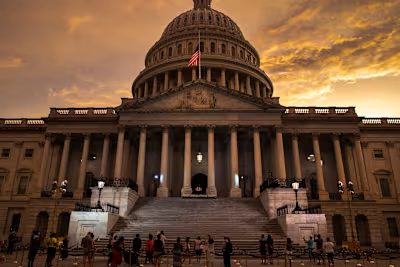An Era of Exhaustion

Over recent decades, income inequality has begun to disproportionately affect younger generations and feed into an equally stark rise in burnout, or chronic stress.
"Any stress burnout is chronic stress," according to Bruce Rabin, a retired pathologist who has researched the negative health implications of stress.
Compared to older generations, Gen Z and “younger millennials” feel the
most stressed and overwhelmed, according to a 2022 poll from Gallup. The report found that workplace stress has been steadily increasing across generations, with 40% of baby boomers, 56% of Generation X, 63% of older Millennials and 68% of Gen Z and younger Millennials feeling stress “a lot of the time.”
It is clear that stress is higher in younger people, but Ryan Pendell, the lead author of the Gallup report, speculated that while financial issues may be a factor, it may also be a general fact of life that younger people tend to have more stress than older people.
“My general sense is that younger people are more stressed (and) report more stress than older people,” Pendell said. “I think that stage of life is certainly a factor. Younger workers are interested in career development generally, and they’re interested in increasing their pay.”
Economic stressors for today’s youth tend to be worse than for previous generations at the same stage of life, according to Rabin.
“For young people, there is less chance today of getting good employment, of maintaining your job and advancing in a job,” Rabin said. “There is so much competition because there are so many unemployed people.”
Despite having become the largest generation in the American workforce, millennials controlled just 6.2% of wealth in the U.S. as of 2022, the lowest amount of any generation by far, according to data from the Federal Reserve. Baby boomers, on the other hand, controlled a clear majority of wealth at more than 52%. Generation X held 29.1% of wealth, and the Silent Generation held 12.36% of wealth, nearly twice as much as millennials, despite being 78 years old at the youngest and having far fewer members.
In a 2020 study that analyzed decades-worth of data from the U.S. Federal Reserve’s Survey of Consumer Finances in the Journal of Political Economy, the authors found that poverty and income inequality have both been on the rise. In the study’s conclusion, the authors note “the American middle class was the main loser of increasing income concentration at the top,” as younger generations have lost the most wealth.
Unfair treatment at work is the most important factor in work-related burnout, according to Pendell.
“If people feel like they're unfairly treated, or they're disrespected at work, or the policies or the way that they're managed, make them feel like things are unfair, then that's a major factor in whether that person is going to say that they're also burnt-out are very often burnt- out, or always burnt-out at work,” Pendell said.
Susan Roxburgh, a sociologist and professor at Kent State University, said she does not agree with the term ‘burnout.’
“My reason for feeling that way about it (the term 'burnout') is because that is something that happens to the individual. It leads us into the notion that this is a problem that has individual solutions,” Roxburgh said. “It used to be related to type-A personality—that was kind of the classic idea of burnout—which was antithetical to sociological thinking about stress, which is more focused on how variation and stress outcomes like depression is a social phenomena.”
Roxburgh said that variation largely comes from socioeconomic differences, including income, education, quality of one’s work and one’s resources to manage any roles they have, like being a parent.
A lot of Roxburgh’s work has focused on the idea of time pressure, which is the “idea of perpetually ending the day feeling like you've not done what you needed to do,” Roxburgh said.
“I did one study where I had 1,000 people and I found that income—household income—was a moderator of the relationship between time pressure and depression,” Roxburgh said.
“The level of that moderator influences the degree of association between those two things: time pressure and depression. In other words, you take account of household income, the association—which is a very strong one—between depression and time pressure goes away,” Roxburgh said. “So that means that high income people who feel the same amount of time pressure as low income people are not depressed as a result, whereas the low income people with that same amount of time pressure are depressed.”

Health and Burnout
As burnout and financial issues continue to disproportionately burden younger generations, they tend to not only have drastic effects on both mental and physical health, but also tend to catch people in a loop.
For instance, poverty leads to safety issues, which can exacerbate symptoms of burnout, and burnout generally is associated with high levels of stress hormones, according to Rabin. These high levels of stress hormones can lead to consequential mental and physical health problems, which can then lead to further financial problems, and so on.
“It’s not being able to go outside without worrying about crime, without worrying about being assaulted,” Rabin said. “It’s … having to keep your house very cold because you can’t afford to pay your gas bill. It's not having enough food to feed your kids … It’s your young kids developing diabetes because of the excess weight they’ve gained from the crappy diets. Poverty is a stressor.”
There are three major mental health implications linked to burnout according to Rabin: an inability to focus, a higher likelihood of depression and decreased ability to remember things from a young age.
“This is all due to damage to neurons in the body,” Rabin said, which leads to higher blood pressure, increased risk of stroke, higher cholesterol, a less efficient immune system to stave off infections, and an increased chance for the immune system to cause an autoimmune disease.
“There's more difficulty managing diabetes, because the stress hormones convert fat in the liver to sugar,” Rabin said. “There are increased amounts of inflammation in the body, which affect cognition, make people feel depressed and are associated with shorter lifespan. There is a decreased ability of wounds to heal because the stress hormones interfere with the healing process.”
Stress hormones can also shorten the length of telomeres, or the caps on the ends of chromosomes, which can lead to increased risk of disease.
Burnout is also linked with poor sleep quality according to Deirdre Conroy, a sleep psychologist and Clinical Director of the Behavioral Sleep Medicine Program at the University of Michigan.
“Lack of sleep can contribute to changes in mood the following day,” Conroy wrote via email. This can lead to “more anxiety, irritability, and sadness,” and “can exacerbate feelings of burnout.”
A 2021 study from the journal Healthcare, showed that high levels ofburnout indicate the presence of sleep problems in nurses during the COVID-19 pandemic. According to the study, While a lack of sleep leads to burnout, burnout can also lead to sleep problems, indicative of a negative feedback loop.
In addition to mental health issues, a lack of sleep is also directly linked to increased risk of heart attack, according to a 2014 study published in the journal Open Heart.
The report found that following daylight savings during springtime, in which participating areas lose an hour of sleep, there was a correlating 24% increase in the rate of heart attacks the following day. During the fall, however, when areas gain an hour of sleep, there was a 21% reduction in reported heart attacks, according to the report.
As a whole, Americans’ sleep has gotten noticeably worse since the 1940s, according to a 2013 poll from Gallup. The organization found that 84% of respondents got seven or more hours of sleep in 1942, compared to just 59% in 2016.
However, Millennials are generally getting about 22 more minutes of sleep than Generation X, according to a study from the U.S. Bureau of Labor Statistics, which may suggest a healthier attitude toward sleep among younger generations.
Rabin, who has a free course on managing stress, shared some ways to reduce it.
“You need friends, you don’t want to be lonely,” Rabin said.” “You need to be high in optimism. You need a sense of humor. You need to be physically fit … doing a lot of walking. And being spiritual … whatever you find calming we consider to be spiritual. Then there is deep breathing.”
There are also exercises that can help reduce stress, including humor and expressive writing.
“Writing for 15 minutes about whatever is bothering you than tearing it up. flushing it away so nobody can ever see what you wrote, which allows you to write about things you can't talk about. And it's another powerful (strategy,)” according to Rabin.
“There’s a trick we have with humor,” Rabin said. “We ask people to create an imaginary box inside their head and then to put something they find funny into the box. Then when they're experiencing stress, all you have to do is take out that funny thing from the box and think about it. And as you think about it, it shuts down the production of the stress hormones.”
Like this project
Posted May 10, 2023
In this project, I interviewed experts and wrote about the generational differences in burnout, along with its economic and health implications.
Likes
0
Views
7



